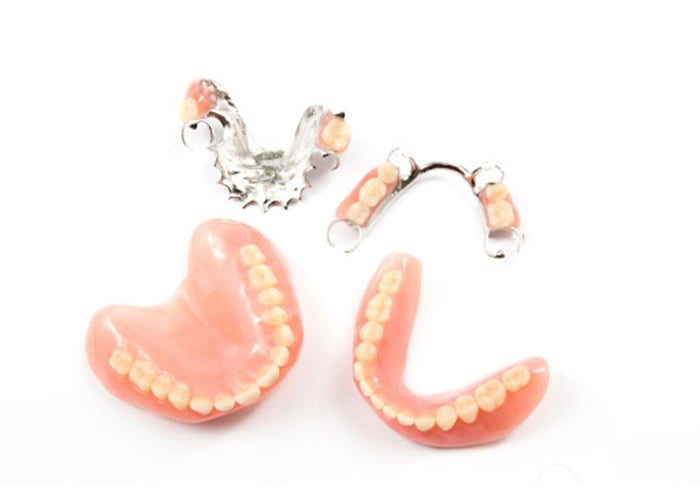Looking for information about partial dentures ? Whether you’re considering getting partial dentures or already have them, our guide has the answers you need.
What are partial dentures?
Partial dentures, also known as removable partial dentures, are dental prostheses designed to replace one or more missing teeth in the mouth. They are typically made of a metal or plastic framework that supports the artificial teeth and gums and are removable, allowing them to be taken out of the mouth for cleaning and maintenance. They are often recommended for patients who have lost some, but not all, of their natural teeth and who want a less invasive and more affordable alternative to dental implants or bridges.
Why would one need partial dentures?
Partial dentures are an effective solution for patients who have lost multiple teeth in the top or bottom of their jaw. The loss of teeth can be caused by a variety of factors, such as injury, decay, or removal of teeth. It can have a significant impact on the ability to speak, eat, and smile with confidence, as well as the alignment of the remaining teeth. If the remaining teeth are not strong enough to support the partial dentures, they may become loose or unstable, which can cause discomfort and other problems.
What types of partial dentures are available?
There are several types of partial dentures available, and the type that is best for you will depend on your individual needs and preferences. Here are some of the most common types of partial dentures
Cast Metal Partial Denture
An acrylic (plastic) foundation and a metal frame are used in cast metal partial dentures to improve stability and extend the life of the dentures. Although they can be created to match the color of the gums and are unlikely to be observed by others, some patients are initially worried about the appearance of the metal with the dentures. They work well for patients who prefer a snug fit so they can converse and eat comfortably every day.
Read more: How Much Do Dentures Cost in 2023?
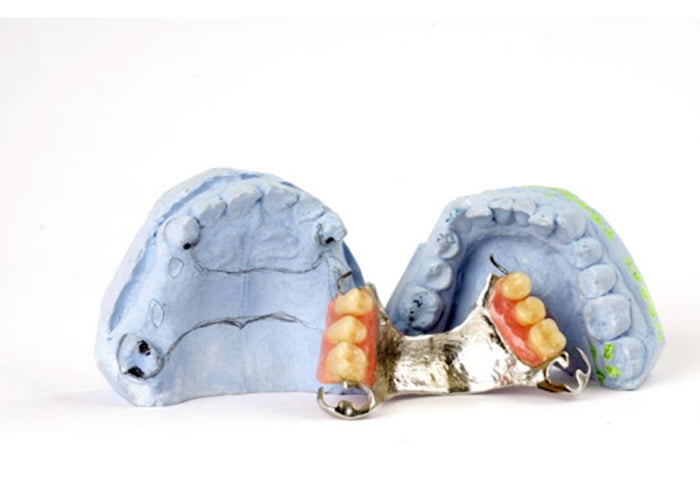
Flexible Partial Dentures
Cast metal partial dentures can be substituted with flexible partial dentures. Instead of using metal, they have a nylon frame, which can seem nicer. They are, however, less frequently chosen than cast metal partial dentures since they are not as sturdy or resilient as those materials.
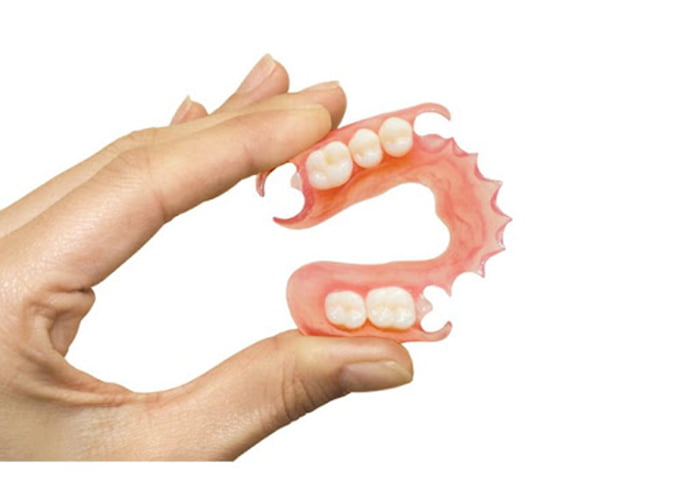
Acrylic Partial Denture
Acrylic flippers, sometimes known as dental flippers, are simple to insert and remove from the mouth and can replace several lost teeth. When a patient is waiting for a more dependable and long-term option, they are frequently utilized as temporary partial dentures.
See more: Dentures Before and After
The acrylic flippers, when worn temporarily, hold the position of natural teeth and prevent moving to guarantee the final restoration fits perfectly. Although less dependable and durable than other partial dentures, acrylic flippers do seem natural.
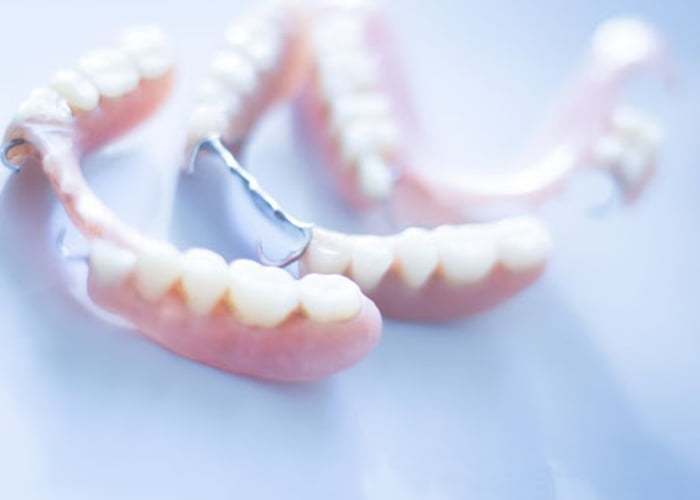
What to Expect When Getting Partial Dentures
If you are considering getting partial dentures, here is what you can expect from the process
Step 1: Comprehensive Exam
A comprehensive exam is recommended prior to fabricating partial dentures to remove any active dental disease. During the exam, a dentist will take note of the patient’s edentulous ridge and ensure there are no root tips or sharp, bony protuberances that could cause irritation or sore spots.
Step 2: Surgery to Remove Tooth Fragments
Any remaining tooth fragments, such as root tips or bony regions, would likely be removed during a minor surgical operation scheduled by the dentist. Transport to and from the dental office, as well as a local anesthetic, are necessary for this operation.
Step 3: Fabricating the Partial Dentures
The denture appliance process begins with custom impressions and a wax rim try-in, which establishes the correct bite and makes it more likely that the dentures will fit correctly and feel comfortable.
Step 4: Fitting and Adjusting the Partial Dentures
Finally, Patients will have a try-on appointment to verify the correct size, shape, and color of their teeth, followed by a final delivery and adjustment appointment in the weeks following.
How Much Do Partial Dentures Cost?
The cost of partial dentures can vary widely depending on several factors, such as the type of prosthesis, materials used, and the geographic location of the dental office. The cost of a partial denture can range from a few hundred to several thousand dollars, depending on the type and materials used. But in general, a set of partial dentures costs between $1,000 and $4,000 on average.
Does Insurance Cover the Cost of Dentures?
Most dental insurance plans cover partial dentures, but it is important to check your individual plan to see if it covers restorative care. Depending on the plan, you may be eligible for up to 50% coverage, but co-pays and deductibles may vary and impact the final cost.
Some plans have an annual limit on the amount that can be covered, and if you have already undergone extensive dental work in the same calendar year, you may find that your insurance company won’t cover the partial dentures at all. It is important to contact your dental insurance plan before getting partial dentures to understand the costs and coverage to make an informed decision.
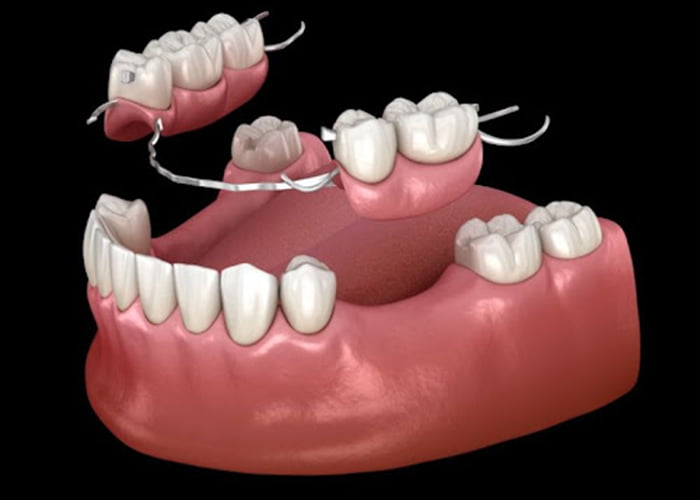
Partial Denture FAQs
Can you eat with partial dentures?
Partial dentures can be difficult to adjust to, but with practice and patience, most people can eat comfortably with them. It is recommended to start with soft foods and chew on both sides of the mouth, and to avoid chewing gum.
Some foods may be more difficult to eat with partial dentures, such as sticky or hard foods. With time and practice, most people are able to eat comfortably with their dentures, allowing them to enjoy a varied and healthy diet.
Are Dentures Worn 24 Hours a Day?
Dentures should be removed at night to give the mouth and gums a chance to rest and prevent any potential complications and should be worn for at least six to eight hours a day to maintain the health of the gums and mouth and extend the lifespan of the dentures.
Are Denture Adhesives Safe?
Denture adhesives are safe when used as directed, but overuse can lead to health problems, such as gastrointestinal problems, skin irritation, or allergic reactions. It is important to choose a denture adhesive that is zinc-free and use it only as directed.
How do I look after my denture?
Proper care and maintenance of dentures is essential to keep them in good condition and ensure they last for as long as possible. Here are some tips on how to look after them: remove and rinse after eating, brush daily using a soft-bristled brush and a mild denture cleaner, rinse thoroughly after cleaning, soak in a denture cleanser solution or water overnight, handle your dentures carefully, visit your dentist or dental professional regularly for a check-up, and take good care of your mouth and gums by brushing twice a day, flossing daily, and using an antiseptic mouthwash.
Make Your Appointment Today
Making an appointment for dental care, including dentures, is an important step toward maintaining your oral health and restoring your smile. If you’re considering getting dentures, or if you already have dentures and need a check-up or adjustment, it’s important to make an appointment with your dentist or dental professional.
To make an appointment, you can call your dental office directly or use their online booking system if they have one. When making an appointment, be sure to let the receptionist know that you are interested in denture care so that they can schedule the appropriate amount of time for your appointment. Additionally, if you are looking for dentists in Marysville, you can also ask the receptionist to look up information about “dentists in Marysville”.

